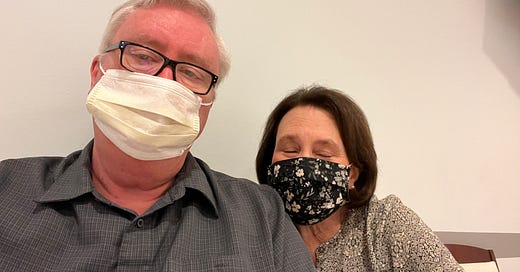Addison's Disease: Understanding the Rare Endocrine Disorder and Its Impact on My Life
Navigating the Challenges of Chronic Illness and Lifelong Treatment in the Face of Adversity
The doctors removed my right kidney in June 2012 due to "clear cell renal cell carcinoma," the most common kidney cancer. I had no health issues until May 2020, when I had to be put on a ventilator for 21 days because of COVID-19. The doctors didn't expect a full recovery, but by God's grace, I achieved it.
Then, in June 2021, I was told that my cancer was back. They gave me immunotherapy infusions once a month and daily medicine until we found a surgeon who would remove the tumors.
On September 27, 2022, he removed both of my adrenal glands and my right testicle.
Having no adrenal glands puts you into Addison's disease.
I thought you might like a little information on what it is like to live with Addison's disease. You probably know others who are living with the rare endocrine disorder. Addison's disease is characterized by the adrenal glands' insufficient production of certain hormones.
What is Addison's disease?
Addison's disease, also known as primary adrenal insufficiency, occurs when the adrenal glands cannot produce adequate amounts of two critical hormones: cortisol and aldosterone. The adrenal glands are small structures on top of the kidneys that play a vital role in regulating various bodily functions.
Remember, I do not suffer from an insufficiency of these critical hormones but a total lack of them.
Causes
The most common cause of Addison's disease is autoimmune adrenalitis, where the body's immune system mistakenly attacks and damages the adrenal glands. Other potential causes include:
Tuberculosis
Fungal infections
Cancer that spreads to the adrenal glands. This happened in my case. Any time new cancer occurs in my body, it is just part of the metastatic spread of my kidney cancer. Doctors classify it as Stage 4 when it spreads.
Genetic disorders
Symptoms
Addison's disease typically develops gradually, with symptoms appearing over months or years. Common symptoms include:
Extreme fatigue
Weight loss and decreased appetite
Darkening of the skin (hyperpigmentation)
Low blood pressure
Salt cravings
Nausea, diarrhea, or abdominal pain
Muscle and joint pain
Depression or irritability
This list of symptoms pretty well sums up what I experience regularly. I suffer most from extreme fatigue, muscle, and joint pain, and being a pain in the neck to my wife and those closest to me.
Treatment
Addison's disease is a chronic condition that requires lifelong treatment. The primary treatment involves hormone replacement therapy:
Oral corticosteroids (e.g., hydrocortisone) to replace cortisol
Fludrocortisone to replace aldosterone
Patients must also learn to adjust their medication dosage during times of stress or illness to prevent an adrenal crisis.
My biggest problem is knowing when to updose or take more steroids due to how I am feeling. Too many steroids are not good for you; really, it would be best not to use steroids, but as my doctor says, it is the only thing that keeps me alive.
Adrenal Crisis
An adrenal crisis is a medical emergency that can occur in people with Addison's disease when their bodies are under significant stress. Symptoms include severe weakness, confusion, pain in the lower back or legs, and severe abdominal pain. Immediate treatment with injectable corticosteroids is necessary.
At this moment, just under two years, I have not needed the injection or had a genuine crisis.
Living with Addison's Disease
With proper treatment and management, most people with Addison's disease can lead normal, active lives. However, they must:
Take medication as prescribed
Carry a medical alert card or wear a medical alert bracelet
Learn to recognize signs of an impending adrenal crisis
Work closely with their healthcare team to monitor their condition
While Addison's disease presents challenges, advances in treatment have significantly improved the outlook for those affected by this rare endocrine disorder.






Praying for you and Betty!